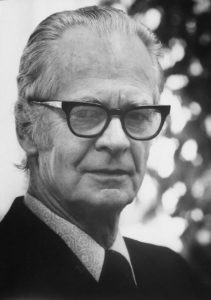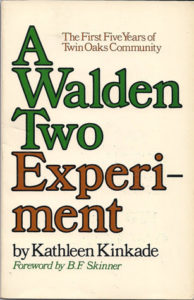
About a year ago I reread the book “Walden Two” by B. F. Skinner. Walden Two is a novel about a Utopian society based on the new behavioral science principles. The book was a product of its time, published just after World War II. It isn’t a book I recommend, although I think it was one I read originally for a college or high school class.
I do not find B. F. Skinner’s idea of a perfect society convincing. The book is preachy and goes on and on and on about behavioral techniques that eliminate the bad in human nature. But I have remained intrigued by the idea of Utopian societies. Many have tried. All have failed, or at least failed to alter society in general by much. Yet people still keep trying.
In some ways, I think a church is an attempt at a Utopian society. If we can all agree on certain Christian principles, we should be able to live together in peace and harmony, acting on our best instincts. The problem, of course, is that our human nature inevitably gets in the way. We rarely agree, or agree for long, on what the best courses of action are, even among committed Christians. But pastors and parishioners still try.
 So, when I heard that there was a community that was trying to live based on Walden Two principles, I decided to examine it further. Kathleen Kinkade wrote about the Twin Oaks community and published a book about it in 1974 titled “A Walden Two Experiment.” Kinkade was one of the founding members of the community. She and a group of other idealists pooled their resources and created a community on a farm in Virginia. Kinkade writes honestly about the joys and struggles of creating a new society. Although the group started out to be based on the principles in Walden Two, it has since moved away from behaviorism.
So, when I heard that there was a community that was trying to live based on Walden Two principles, I decided to examine it further. Kathleen Kinkade wrote about the Twin Oaks community and published a book about it in 1974 titled “A Walden Two Experiment.” Kinkade was one of the founding members of the community. She and a group of other idealists pooled their resources and created a community on a farm in Virginia. Kinkade writes honestly about the joys and struggles of creating a new society. Although the group started out to be based on the principles in Walden Two, it has since moved away from behaviorism.
 Amazingly, the Twin Oaks community is still a viable community, although different from when it was founded. Kinkade wrote a follow-up book, “Is It Utopia Yet?” that was published in 1994. She had moved in and out of Twin Oaks several times and helped set up two other communities based on what she learned. She left community when she was 70 but returned to Twin Oaks when she was in the last stages of breast cancer. The Twin Oaks community took care of her until she died. Twin Oaks has a waiting list of people who want to become members.
Amazingly, the Twin Oaks community is still a viable community, although different from when it was founded. Kinkade wrote a follow-up book, “Is It Utopia Yet?” that was published in 1994. She had moved in and out of Twin Oaks several times and helped set up two other communities based on what she learned. She left community when she was 70 but returned to Twin Oaks when she was in the last stages of breast cancer. The Twin Oaks community took care of her until she died. Twin Oaks has a waiting list of people who want to become members.

Kathleen Kinkade also founded the Foundation of Intentional Communities with a website that lists over 1,000 intentional communities in the United States alone. This summer we are living next to a Christian Intentional Community called Bruderhof. People from Bruderhof come and visit us as Fort Necessity. I find the idea of a Christian community where everything is shared intriguing. I believe this is the way we should live as Christians. But I’m not sure I will ever be able to put enough of myself aside to live like it.
The Walden Two books got me started thinking about what a perfect community would look like. What is your idea of Utopia?
